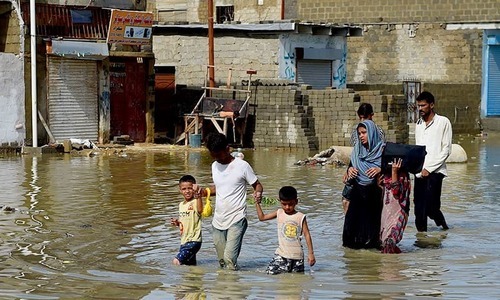KARACHI: In the early hours of Jan 25, in the Ghanchi Para neighbourhood of Karachi, an elected MPA was shot in the leg. Several news outlets reported that the suspect was an elected UC vice-chairman, and that the dispute was over water. I can’t think of a more grim and perfect metaphor for this city: multiple tiers of authority and power, clashing over basic municipal services.
Exactly a week before the incident, I drive through Ghanchi Para, and notice that Nishtar Road is badly flooded. The road leads to several important markets in the area, including Timber Market, a collection of over 300 shops and warehouses. The Karachi Timber Market Group’s leadership is central to improving services such as electricity in this neighbourhood, often directly negotiating with utility companies and the water board for service improvement.
Nishtar Road is also a direct route to the PTI’s spacious, comfortable new office in the constituency. MPA Ramzan Ghanchi [who was shot at] has tried to make it as accessible as possible. But now there are repairs happening on the road leading to his office, and the whole neighbourhood is complaining to the lawmaker about their water problems.
Ask anyone in the neighbourhood, and the story is the same: “Roads have been broken, sewerage has been blocked,” says one woman. A PTI local councillor throws up his hands in despair: “The water board is in their hands.” He means the PPP.
The man accused of being involved in shooting Mr Ghanchi in the leg a week later is Suleman Soomro, the president of the Karachi Timber Market Group. Mr Soomro is vice-chairman of Union Council 16 in district South, where an independent candidate won the last local government election. In district South, PPP controls the chairmanship, and offered the PTI the vice-chairmanship. So who gets to pull rank when there is a water dispute, and whose influence matters more for enforcing service delivery?
Between the Local Government Elections in 2015 and the General Elections in 2018, Karachi has emerged as a dizzying patchwork of electoral and administrative power. And voters know this. In January 2019, just days before the MQM would comfortably win its by-election in Korangi, I was chatting with a group of women in PS-94. They had voted for the PTI in the 2018 national elections, for the MQM in the 2015 LG elections, and for the PPP in every election previous to that.
The MQM had brought them water connections and cleaned their gutters. The MQM’s control over local administrative functions stemmed from its enormous labour union support in the Karachi Municipal Corporation and the Karachi Water and Sewerage Board (KWSB) — linemen and valve operators were provided jobs during previous party rules. More recently, the KWSB was taken over by Sindh’s provincial government, headed by the PPP.
Eventually, however, party loyalties begin to matter less than money. Stories abound in the press of industrial areas and individual factories paying millions of rupees to get dedicated lines of water and electricity. The MQM and PPP know this costs them votes, so in Korangi and Lyari they strategically used their local government budgets to pay off and pay for domestic water supplies. Other utilities, such as electricity, are taken out of their hands almost entirely.
These parties, whose bread and butter in the city for decades has been wasta, or patronage, now tread a tightrope between complaining that they have no power over public goods’ administration, and leveraging the power they do have to hold on to their UC, provincial and national seats.
For years, the provision of public goods in Karachi was embodied in local bureaucrats who had intimate knowledge of the city’s vast and shambolic service delivery system. These were individuals who understood the pipe networks delivering water to the city, the ones with gully-mohalla knowledge of gutters, taps, hydrants, transformers, electric cables, wires and garbage dumps. For years, they were linked to local power, and frequently to one of these two parties [the PPP and MQM].
But political power has increasingly become synonymous with, and frequently given way to, purchasing power. In addition to creating obvious problems for households who are unable to purchase these services or compete with powerful commercial consumers, this creates problems for the incumbent parties — now, upstarts such as the PTI can also “get work done”, provided the right combination of money and political pressure.
In other parts of the world, political upheaval presents important opportunities. When faced with challengers, parties may try to “tie their own hands” — design policies to insulate service delivery from political influence of their rivals, even if this means losing influence themselves. That’s the optimistic view of what could happen in Karachi. The pessimistic view? More money competing for the same resources — and more problems.
The writer studies electricity and electoral politics in Karachi. She is a PhD candidate at Georgetown University.
Published in Dawn, February 1st, 2019













































